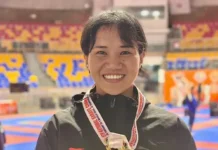JOLLANG, 8 Feb: A two-day national seminar, organised by the economics department of Don Bosco College Itanagar on ‘Challenges and Opportunities for Socioeconomic Development in Rural Areas of Northeast India’, concluded here on Saturday.
The second day saw the second and third input sessions and the third technical session of the seminar.
In the second input session, former DNGC economics assistant professor Dr A Ibotombi Singh and founder of Naara Aaba winery Tage Rita Takhe provided their insights.
Dr Singh described entrepreneurs as “the fourth factor of economy,” and said, “They not just seek profit but also bring new ideas and changes that help in the growth of economy.”
He said that the Northeast is rich in resources but faces challenges such as lack of public infrastructure, militancy, geopolitics, and lack of chain transportation. He also stressed that in today’s times, land, labour, capital, and entrepreneurs are the main factors of economic growth.
Takhe cited her own experience of challenges such as risk lack of knowledge of the business as a first-generation graduate from the family, lack of knowledge of the business, red tape, corruption, cutthroat competition, and the Covid pandemic.
She said that her product, Naara Aaba wine, has been studied by IIM Shillong and the IB Business Foundation, and was also featured in ‘Shark Tank’, and added that “these days there is a positive ecosystem among the entrepreneurs of Arunachal Pradesh and a sense of transparency and accountability within the system.”
In the third input session, RGU Botany Department Head Prof Sumpam Tanjang, and Nagaon (Assam)-based Mahapurusha Srimanta Sankaradeva Vishwavidya-laya Economics Head Dr Ajit Debnath provided their inputs.
Prof Tanjang spoke on enhancing rural development through sustainable development in Arunachal, and highlighted the importance of agroforestry. “This traditional practice provides food security and sustainability,” he said, and added that agroforestry provides opportunities for farmers to improve their economy.
Dr Debnath spoke on the impact of waste management on rural development. He said that solid waste is a burden that needs to be converted into energy. “It is already being done in urban areas,” he said, and added that solid waste management is often neglected in rural India due to limited resources, lack of awareness, and inadequate infrastructure.
The third technical session was chaired by Dr Debnath, and 10 papers were presented by assistant professors and research scholars from all over India on the sub-theme of ‘Environmental, Legal, and Policy Issues’.


